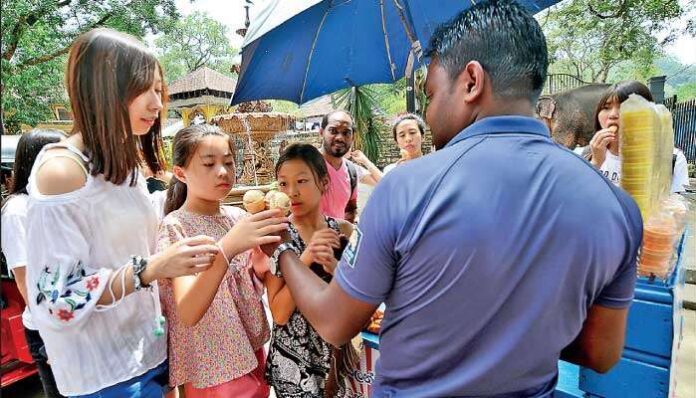The small and medium sector offers a diverse band of services and individuals from all over the country – Pic by Shehan Gunasekara
- Outdated regulations hinder SME sector from offering basic service to travellers
- Potential for further growth remains high
- Regulators must consider practicalities and offer better licencing
By Kushlani De Silva
The resurgence of tourism into Sri Lanka after it was stricken by the pandemic for nearly two years has breathed welcome life and colour to the industry and its value chain. For years, tourism was perceived as an industry centred around glistening hotels and resorts. But following the Easter attack and the subsequent exodus, it became ever more apparent that Sri Lankan tourism consists of a much broader and organised informal sector that infused significant value to the taste and experience of Sri Lanka.
The small and medium sector offers a diverse band of services and individuals from all over the country. They range from bustling beach houses and homestays in the south, pulsating restaurants and bars in Ella, boutique villas adorning the central hills, tumbling tuk-tuk rides in Tangalle and smiling roadside vendors and snake charmers of Sigiriya. They form the real Sri Lankan experience that run far and beyond the clinical pleasures of listed resorts.
There were many attempts to regulate and define Sri Lanka’s small and medium tourism sector. The last such measure was a program launched in August 2021, when the Sri Lanka Tourism Development Authority commenced a membership drive to register what it said was over 55% of the tourism industry – on accommodation and restaurants alone. The relaxed documentation process and promise of assistance saw a 48% rise in registrations, but a significant number continue to operate outside the formal fold.
There is hardly any issue in providing room for the SME sector to operate as they do. Last year, the Thai SME in tourism contributed to 22% of the country’s GDP, whilst 70% of Indonesia’s tourism value chain sits outside the formal fold. Tourism accounts for 26% of GDP in the Caribbean and more than 40% of its participants comprise the informal sector. However, as many activities outside tourism depend on this sector, its real contribution to GDP is much larger. Therefore, Sri Lanka must focus on lending necessary support and infrastructure for its informal tourism sector to thrive. The industry will then take care of the rest. The Authority must simply focus on improving the quality of the product, including regulations for better transportation, information, connectivity, safety and support services. In today’s context, an uninterrupted power supply is imperative for a better tourism experience, and to ensure they return to Sri Lanka.
One of the primary drawbacks for operators in Sri Lanka is its outdated laws and bureaucracy. A prime example is laws that govern the sale and serving of alcohol to tourists. Sri Lanka cannot anticipate to grow its promise of sun and sand to travellers, if it doesn’t make room for access to alcohol products such as beer and wine. But archaic laws that govern sales, accessibility and licencing in the wrong hands of authority are proving an impediment to growth in this segment.
As detailed by Amila Premathunga, of the Ella Hotels Association, restaurant-owners and hoteliers cannot hope to attract tourists for meals if they do not offer beer or wine over lunch and dinner. He lamented they are forced to sell products to tourists without licenses, as existing archaic laws and systems are prohibitive of efforts to obtain the relevant clearance.
He adds that some officials exploit the outdated rules and have resorted to extorting bribes of up to Rs. 50,000 a month from hoteliers, and this is detrimental to the industry which in turn impacts service. Premathunga revealed these officials continue to fan a stigma that permitting alcohol sales will lead to the destruction of the country, and extort bribes and mete other forms of harassment to operators serving alcohol.
“Tourism is an important sector for the country, and we are doing everything possible to offer a great service and experience to customers from all over the world. We cannot operate without offering products such as beer or wine to our foreign guests, and we have managed the situation well without letting local consumers abuse the situation. Several attempts were made to obtain licenses, but we keep getting turned back as officials counter us with various regulations, which is compounded by the lack of coordination between departments.”
“They must be practical. For instance, one Tourist Board regulation stipulates the kitchen must have all stainless-steel appliances. These are small-scale outlets and not everyone has access to or works with stainless-steel appliances. In addition, based on turnout of a season an operator may quickly add a room to their facility to meet demand. This is a problem for the authority and impedes licencing and other regulatory processes. But, at the same time it meets the needs and demands of our visitors to this destination. Therefore, I wish to urge authorities to consider these practicalities and the challenges posed to us in devising regulations, as we form the frontline that is serving our guests,” Premathunga averred.
Due to the prevailing situation, operators face many challenges from corrupt officials where they “are treated worse than criminals on some instances”, he said. These operators are rendering a service to the country, and are doing their best to serve our valued guests who bring in much-needed foreign exchange to the country, and expressed hope the Government could consider that aspect positively, Premathunga said.
A majority of the small and medium scale outlets in Ella operate without a license to serve alcohol products due to this situation. Premathunga’s views were echoed by hoteliers from the southern part of the island who also spoke of discriminatory practices with respect to tourist events and offerings by hotels. Another disruptive piece of outdated legislation is the regulation that bans serving products between 2 p.m. and 5 p.m. This is considered a prime operating hour for tourists, but as per our laws no one could be served.
As alluded to before, the small and medium sector consists of a large number of local livelihoods that thrive off tourism, whilst offering a broad range of services to visitors to our country. A 2020 Asian Development Bank report on Sri Lanka found: “The expansion of the tourism sector mainly relies on small and medium-sized enterprises existing in various related sectors. The development of tourism depends on SMEs to fulfil the needs and wants of tourists. With tourism development, local people have golden opportunities to offer services or sell products to local and foreign tourists.”
Service charges and ‘tips’ go a long way in enhancing the quality of life and value to rural Sri Lankans supporting the trade. Policymakers must look at ways to enhance the traveller experience and induce them to indulge and spend more; provide necessary support and a conducive environment for operators to offer a quality experience to visitors. Food and beverage form a large part of this experience, and alcohol products go hand-in-hand to enhance the taste of paradise.
Tourism is making a comeback to Sri Lanka in 2022, and notwithstanding the ongoing situation in Europe the country is poised for a good winter at the end of the year. The Tourism Development Authority together with its affiliated ministries must urgently consider the practical elements that govern and enhance our tourism product and provide necessary meaningful support to the industry. The country needs to revisit its outdated regulations and realign them to suit and serve the world, plus, to empower Sri Lankans from all walks of life to take on the world.
Tourism contributes to nearly 13% of GDP in Sri Lanka, and with the right amount of support this number can no doubt grow to 20% over the next five years. The Government has been bold with a number of its reform programs and have set the ball rolling for constructive change that has been long overdue in Sri Lanka. Similarly, one can anticipate given some of the proposals in the pipeline that the Government would take a progressive step towards enhancing the tourism experience in Sri Lanka.
Unlock the world’s wonders with unforgettable journeys tailored just for you! Whether you crave sun-kissed beaches, thrilling adventures, or rich cultural escapes, your dream destination awaits. Enjoy seamless travel with expert tips, exclusive deals, and handpicked experiences that Turn Every Trip into a lifetime memory.










